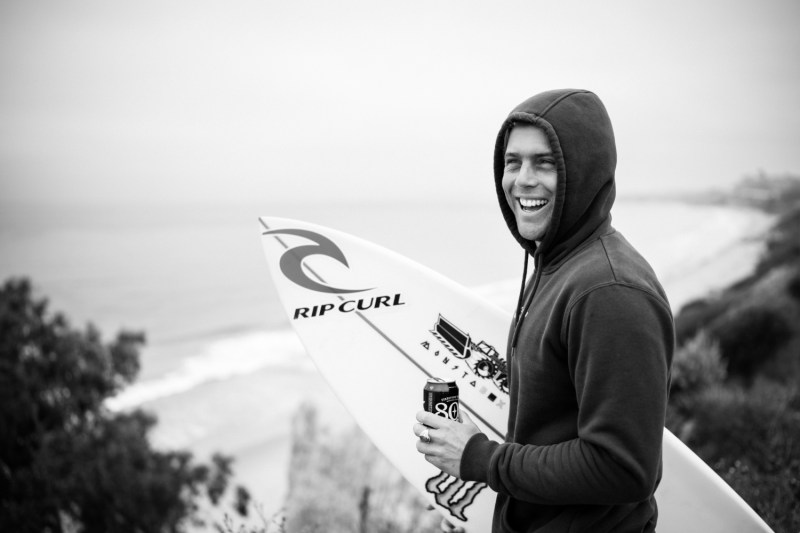There are some roles many of us will never play. Pro surfer is certainly one of them, as there are only an estimated 1,500-2,000 worldwide. It’s an elite profession of daredevil folks that involves travel all over the planet at the drop of a hat. You go where the waves go.
Conner Coffin grew up surfing in his native Santa Barbara, but he was fortunate enough to travel the world with his family at a young age. He caught his first wave at age four in Hawaii, thanks to a persistent dad. As he bounced around the globe, he brought his board with him, chasing waves and fine-tuning his skills.

Coffin just wrapped up a cool video with one of his partners, 805 Beer. It captures the surfer’s lifestyle and appreciation for a nice cold one now and again. But we wanted to hear a little more about this rather elusive career path.
For the unfamiliar, surfing is very much its own thing. It involves throwing yourself at the mercy of the ocean, sometimes to a fault. But there’s beauty in that kind of submission, and the best surfers in the world manage to walk that tightrope between sheer joy and imminent danger.
Surfing is an independent sport, but pro surfers have a community
But, what is it like hanging out in that very select scene? “It’s a cool community for sure,” Coffin says. “It’s interesting because surfing is such an individual sport and the community of professionals is spread all around the world. In Santa Barbara, there are only a couple of pro surfers, so I’m not always connecting with other pro surfers on a regular basis. What is super cool about it, is that I have friends all over the world! Surfing has introduced me to some great people all over that I have become close with.”
It’s important to have hobbies
Hobbies help in general and also with the decidedly independent nature of pro surfing. Coffin is into music and playing the guitar, fishing, gardening, and cooking. In fact, he likes to whip up his own meals on a quest to stay healthy and ready for his next competition.
“I love food and cooking, so sometimes I’m not super ‘strict’ about what I eat, but I love to source good ingredients while I’m home — whether that is from my garden or farmers market or fish that I catch, etc.,” he says. “I try to be conscious of where my food is coming from and support local farmers, fishermen, or well-sourced meat and poultry. I’m definitely not perfect, but I’m really trying to be better and better about this all of the time. I avoid processed and junk food almost always and try to eat good whole foods and grains.”
Even pro surfers have their dream surf spots
Of the many places Coffin wants to ride waves someday, Ireland and Scotland are on his shortlist. “I haven’t made it yet, but I know I will someday,” he says.
But it’s a rigorous calling, with meets all over the planet. It’s called being on tour, so while it’s a bit like being a pro golfer, it’s way more dangerous and the destinations are a little cooler, usually. “For the last six or seven years when I was on the championship tour, I was traveling probably six-to-seven months of the year at least,” he says. “I would have quick stops at home in between events sometimes but it was a ton of time on the road. Prior to that, it was a little less, but not by much. Currently, the schedule for the qualifying series is a little in limbo but it will probably be about three-to-four months on the road.”
Staying fit is paramount on such a journey. Coffin does so in a variety of ways, from fitness routines to just plain cooking right. “I have done a lot of different stuff over the years to stay fit when I’m not surfing,” he says. “A lot of it is based on what my body is going through and trying to find solutions to injuries. I have worked with trainers over the years doing functional movement, weight lifting, HIIT workouts, pilates, yoga. In more recent years I have tried to take what I’ve learned through all of that to do what I feel my body needs. Sometimes, that’s doing more HIIT workouts, or sometimes it’s more rest and mobility and stretching.”
Conner Coffin’s advice for those starting out
“I would say to enjoy your time in the ocean,” he says. “To me, falling in love with surfing started with just loving being in the ocean. I think it’s just really healthy to be in the ocean. Secondly, would be to take it slow and make sure you get some advice from someone who can make sure you are surfing at a good spot to learn and are going to be safe. It’s getting more and more crowded and it’s important to know how to navigate a lineup to make sure no one gets hurt.”


